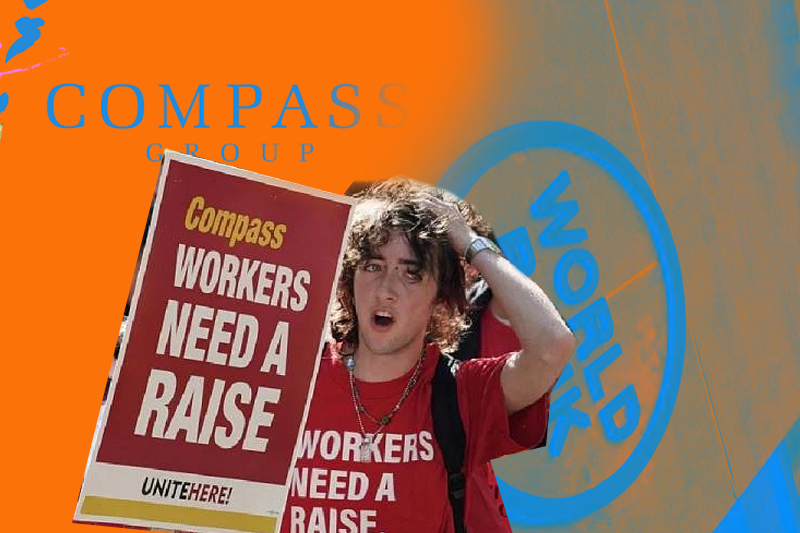
employees of the anti poverty world bank have financial difficulties
14 April, Washington (AP) Andre Blount says he has worked at the World Bank’s headquarters for almost ten years and has only received one raise totaling fifty cents.
Blount and his coworkers are trying to draw attention to what they see as a galling situation:
The employees who put food on the table for an organization whose mission is to fight poverty are themselves struggling to get by. This week, leaders from around the world are in DC for the spring meeting of the organization.
Union leaders claim that in order to make ends meet, a quarter of the World Bank food workers hired as contract workers by Compass Group North America rely on public assistance programs like SNAP or food stamps.
Blount, 33, joined red-shirted union members this week on a picket line outside the development bank on a hot afternoon and declared, “It’s sickening.”
“They travel the globe looking for ways to assist people, but there are hundreds of employees in DC who are having difficulties.”
Meanwhile, inside, businessmen in suits were moving through the lobby, buying “End Poverty” t-shirts and tote bags.
The large cafeteria in the building has a view of an indoor pond and can satisfy even the pickiest eaters. There is a soup station called “Ladle and Crust,” a “Mediterranean Table” station that serves hummus and tabouli, and a sushi chef who makes rolls and sashimi to order.
Delegations from India, Bangladesh, Bhutan, and Sri Lanka had lunch at a nearby fine dining room for diplomats and special guests of the bank.
It turns out that many of the food service employees are from nations where the development bank dispatches missions.
After ten years of employment, Blount claims to be paid USD 18, which is more than the DC minimum wage of USD 16.10.
He claims that serving and catering to some of the most important people in the world should pay more than the minimum wage.
One of about 150 Compass employees working at the World Bank is Blount, a member of Unite Here Local 23.
They are negotiating a new contract and are requesting better pay and health benefits.
The World Bank’s staff has “deep admiration and respect” for their coworkers in the food service industry, according to World Bank spokesperson David Theis, even though the bank is not a party to the negotiations between the union and Compass Group. He claimed that throughout the pandemic, the bank made sure the employees were paid.
Although USD 18 an hour may seem high in some places, the District of Columbia is listed as paying USD 22.15 an hour in the Massachusetts Institute of Technology’s “living wage” index.
The minimum wage in DC will rise to USD 17 per hour on July 1 for all employees, making it one of the highest minimum wages in the nation.
Keep Reading
The increase occurs at a time when workers’ paychecks are being eaten away by high inflation and the median rent in Washington, according to Zillow, is USD 2,571.
On a conference call with reporters, Unite Here President D. Taylor stated: “The World Bank says its mission is to promote shared prosperity by increasing the incomes of the poorest 40% of people in every country.”
“We believe that begins with paying food service workers in the United States. Despite their efforts, they have trouble paying their bills.
Compass Group’s spokeswoman, Lisa Claybon, stated that the company was eager to reach a just agreement and was bargaining in good faith. She continued by saying that the business has a “long history” of putting its clients and employees first.
The National Institutes of Health, the Kennedy Center for the Performing Arts, and the Smithsonian Institution are also included in the current negotiations for Compass employees who serve food there.
Workers worldwide, according to Alex Campbell, director of the International Trade Union Confederation’s Washington, D.C., office, “are suffering from a cost of living crisis that they didn’t cause.”
“Workers everywhere need decent living standards, basic rights on the job, and collective bargaining to end poverty and promote shared prosperity in this turbulent time,” Campbell said.
That holds true for both Compass employees in Washington, DC, and staff members working on World Bank Group-funded projects anywhere in the world.
Blount claimed he merely thinks his employer ought to pay him what he is worth. In addition, he said, “If I were to get a raise from Compass Group, it will help with saving up emergency funds, and paying my bills on time instead of being late.”









